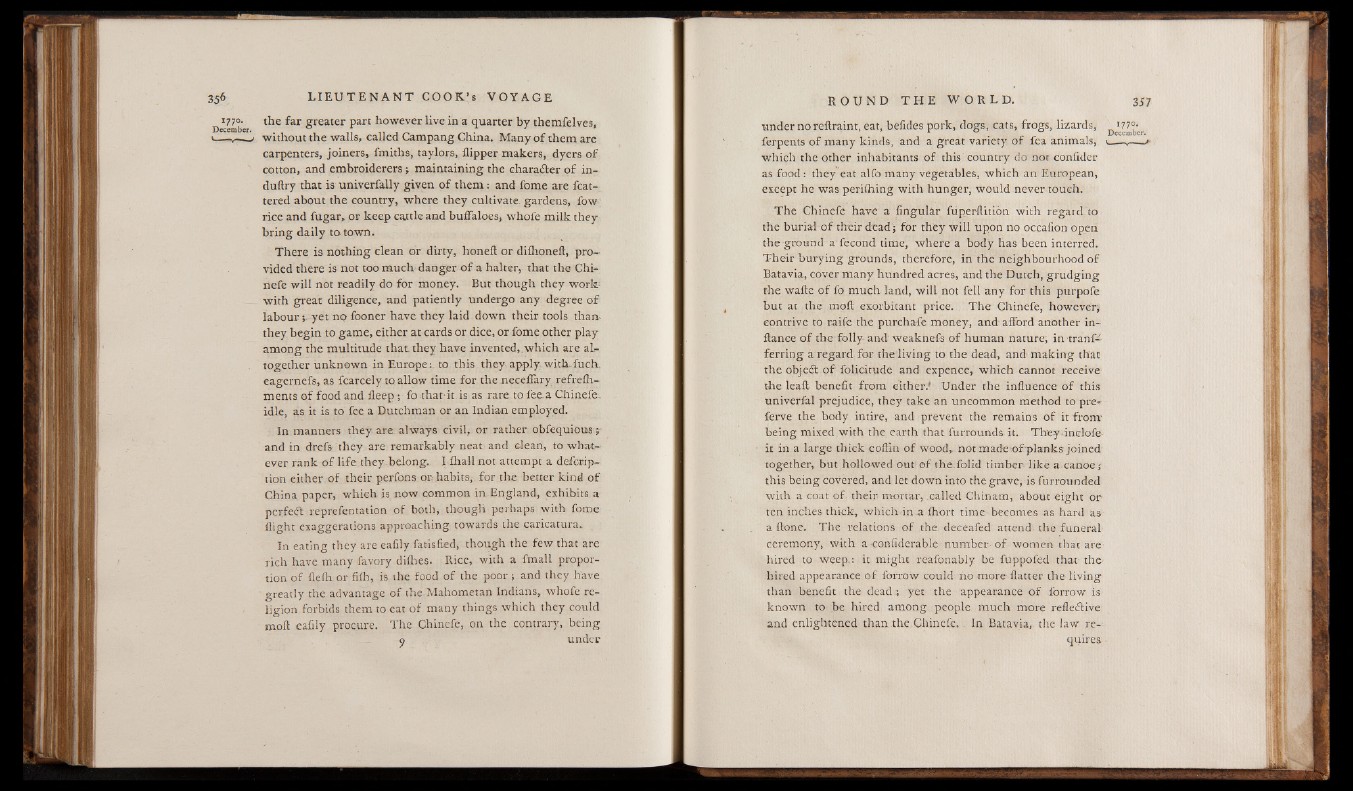
the far greater part however live in a quarter by themfelves,
without the walls, called Campang China. Many of them are
carpenters, joiners, fmiths, taylors, flipper makers, dyers of
cotton, and embroiderers; maintaining the character of in-
duftry that is univerfally given of them : and fome are fluttered
about the country, where they cultivate gardens, fow
rice and fugar, or keep cattle and buffaloes, whofe milk they
bring daily to town.
There is nothing clean or dirty, honeft or difhoneft, provided
there is not too much danger of a halter, that the Chi-
nefe will not readily do for money. But though they work;
with great diligence, and patiently undergo any degree of
labour; yet no fooner have they laid down their tools than-
they begin to game, either at cards or dice, or fome other play
among the multitude that they have invented,.which are altogether
unknown in Europe;, to this they apply with.fuch.
eagernefs, as fcarcely to allow time for the neceffary refrelh-
ments of food and fleep ; fo that' it is as rare to fee. a Chinefe.
idle, as it is to fee a Dutchman or an Indian employed.
In manners they are. always civil, or rather obfequious ;
and in drefs they are remarkably neat and clean, to whatever
rank of life they belong.. I fhall not attempt a defcrip-
tion either of their perfons on habits,, for the better kind of
China paper, which is now common in England, exhibits a
perfe<?t reprefentation of both, though perhaps with fome
flight exaggerations approaching towards the caricatura..
In eating they are eafily fat-isfied, though the few that are
rich have many favory diflies. Rice, with a fmall proportion
of flefh or fifli, is the food of the poor ; and they h'ave
greatly the advantage of the Mahometan Indians, whofe religion
forbids them to eat of many things which they could
molt eafily procure. The Chinefe, on the contrary, being
o under
under no reftraint, eat, befides pork, dogs, cats, frogs, lizards,
ferpents of many kinds, and a great variety of fea animals, t_— .----
which the other inhabitants of this country do not conlider
as food: they eat alfo many vegetables, which an European,
except he was perifliing with hunger, would never touch.
The Chinefe have a Angular fuperflition with regard.'to
the burial of their dead ; for they will upon no occalion open
the ground a fecond time, where a body has been interred.
Their burying grounds, therefore, in the neighbourhood o f
Batavia, cover many hundred acres, and the Dutch, grudging
the wafte of fo much land, will not fell any for this purpofe
but at the mod exorbitant price. The Chinefe, however;
contrive to raife the purchafe money, and- afford another infiance
of the folly and weaknefs of human nature; in tranf-
ferring a regard for the living to the dead, and making that-
the objedl of folicitude and expence, which cannot receive
the leaff benefit from either.' Under the influence of this
univerfal prejudice, they take an uncommon method to pre-r
ferve the body intire, and prevent the remains of it from
being mixed with the earth that furrounds it. They-inclofe
it in a large thick coffin of wood, not made of planks joined
together, but hollowed out of the.folid timber like a canoe;
this being covered, and let down into the grave, is furrounded
with a coat of their mortar, called Chinam, about eight or
ten inches thick, which in a fhort time becomes as hard as
a ftone. The relations of the. deceafed attend the funeral
ceremony, with a-confiderable number-of women that are
hired to weep: it might reafonably be fuppofed that the-
hired appearance of forrow could no more flatter the living
than benefit the dead.; yet the appearance of forrow is
known to be hired among people much more reflective
and enlightened than the Chinefe.. In Batavia, the law requires